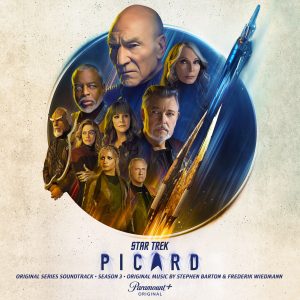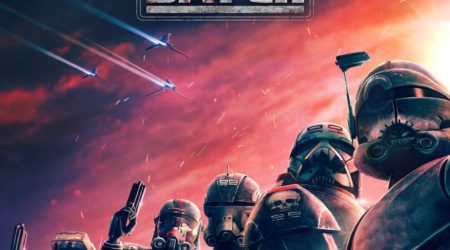
Star Trek: The Next Generation has been quite important to me while growing up, since it was on TV in my teenage years. I have been watching all the Star Trek shows and movies that have come out ever since, and I have seen most of the episodes of the Original Series as well. I was excited when the television show Picard was announced, and I started watching the show, but I never really got into it. I was halfway through the second season, while the third season had already started, when I saw social media blowing up about how awesome this final season was. The main reason for the Internet hype was that the entire crew from The Next Generation was being reunited after more than 20 years. I knew I had to start binging the show, and I was not disappointed.
Jeff Russo, who also had scored Star Trek: Discovery, was the composer for the first two seasons of Picard, and I found his music for the show alright, but it did not speak any Star Trek to me. His music did not have the total orchestral and melodious vibes that always accompanied a Star Trek show or film. I am not familiar with the reason for it, but Russo’s role for the final season was as a ‘supervising composer,’ whatever that means, and Stephen Barton stepped in to write the music for the last voyage of The Next Generation crew.
As usual, I started listening to the soundtrack before watching the show, and I was blown away after just a couple of tracks. The main reason for it was how much this music gave me the Star Trek vibes I needed. In the music, you not only hear inspiration from previous Star Trek composers Jerry Goldsmith, James Horner, Dennis McCarthy and Leonard Rosenman, but also many existing themes from mainly McCarthy and Jerry Goldsmith can be heard in the music.
The first half of the soundtrack album is full of orchestral delight, and the existing themes are woven in at several points in the cues to add extra flair, but also to stay within their welcome. A perfect example of integrating existing themes is the track “Legacies.” In it, you can hear most of the iconic themes from The Next Generation, Voyager, The Original Series, and a hint of the Deep Space Nine theme, which all fit perfectly with the scene. Another clever use of an existing theme is when the Klingon Worf displayed his alien warrior skills, and I heard Goldsmith’s Klingon Theme, which he composed for Star Trek: The Motion Picture in 1979, in the background. I was grinning from ear to ear when I heard that. This theme can be experienced in “Klingons Never Disappoint” if you want to relive that moment.
Not all the themes written for the series are pre-existing, because new themes are introduced as well. One of my favorites is the theme for the spaceship USS Titan, which can be heard in “Leaving Spacedock.” A hint of the theme is present at the start of the track, but around the two-minute mark, you can listen to the theme in full, and it is worthy of being a ‘Star Trek theme.’
At this point of the review, I have only discussed the first half of the album. What makes this score so much more exciting than it already is, is how the music changes in the second half. The story of the second part of this season of Picard becomes even more dark and desperate, which is reflected in the music. In “Proteus,” the orchestral music makes place for more synth sounds together with a solo string instrument, creating an ominous soundscape. The change of musical style is probably also linked to the introduction of additional composer Frederik Wiedmann, who took credit for writing the music for that episode. According to one of the many interviews Barton and Wiedmann had conducted, Barton wrote the music for the first six episodes but was overwhelmed by how much music the show needed. Instead of overextending himself, which he was already doing, the showrunners asked Wiedmann to write music for some episodes. The producers were already using some of Wiedmann’s existing music as a temporary score while editing the scenes, making it a logical step to call him for assistance.
The disappearance of orchestral Star Trek-sounding music does not make the score any less. A magnificent example of great musical scoring is the 7-minute track “Dominion.” The cue consists of a long emotional build-up with solo cello and piano, together with gorgeous long, expressive orchestral melody lines, which fits perfectly with all the dark events happening in that sequence on screen.
I have known the music from Barton and Wiedmann because of their work for Star Wars Jedi: Survivor and The Dragon Prince, respectively. I am happy for them for their success on Picard. It is well-deserved because they were able to write a score that captures the nostalgia of many Star Trek fans but also by adding their own flair to it, to capture all the emotions perfectly. I am sad that Picard is over, but I see a bright future for both composers, for another Star Trek show or otherwise.
Listen or buy
- Buy this soundtrack from Amazon.com or Apple Music
- Listen to this soundtrack on Spotify
Tracklist
The highlights are in bold.
- Beverly Crusher (3:02)
- Old Communicator (1:58)
- Hello, Beautiful (1:57)
- Leaving Spacedock (3:44)
- I Like That Seven! (3:29)
- Breaking the Beam (3:59)
- The Shrike (3:34)
- Picard’s Answer (4:08)
- Riker and Jack (2:08)
- Call Me Number One (2:02)
- No Win Scenario (3:57)
- Blood in the Water (2:58)
- Let’s Go Home (3:24)
- Flying Blind (5:51)
- A New Family (4:16)
- Klingons Never Disappoint (5:32)
- I Do See You (5:26)
- Legacies (3:15)
- Evolution (2:44)
- La Forges (2:08)
- Invisible Rescue (3:34)
- Catch Me First (2:32)
- Proteus (3:46)
- Dominion (7:04)
- Lower the Partition (3:38)
- Get Off My Bridge (4:26)
- Family Reunion (3:17)
- Impossible (1:37)
- Frontier Day (2:43)
- Hail the Fleet (4:03)
- You Have the Conn (3:44)
- Make It So (6:02)
- This Ends Tonight (3:07)
- Battle on the Bridge (2:58)
- All That’s Left (2:02)
- Annihilate (3:05)
- Trust Me (2:06)
- The Last Generation (2:51)
- Where It All Began (2:19)
- The Missing Part of Me (4:30)
- Must Come to an End (1:32)
- A New Day (3:22)
- Legacy and Future (1:44)
- Names Mean Everything (1:43)
- The Stars – End Credits (2:59)
Total length: 2 hours and 30 minutes
Lakeshore Records (2023)




